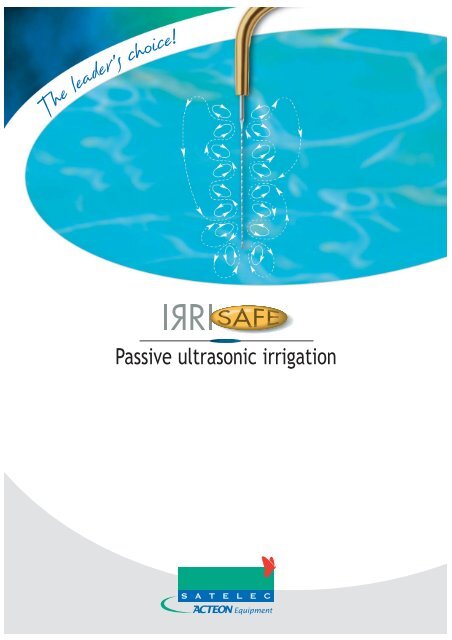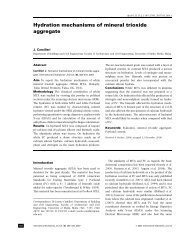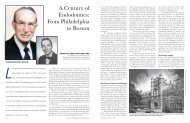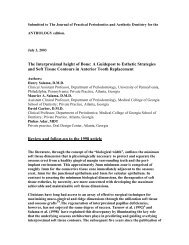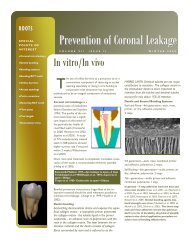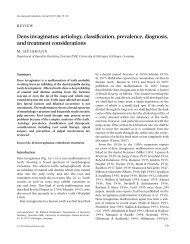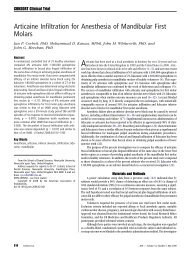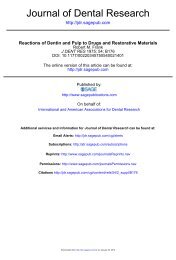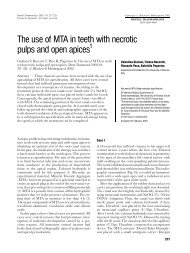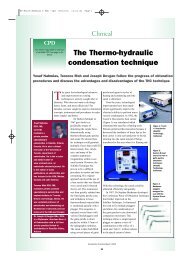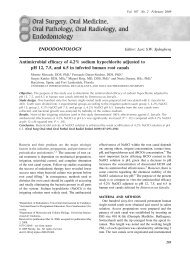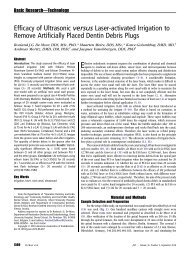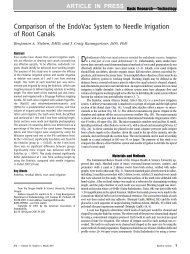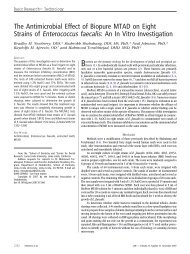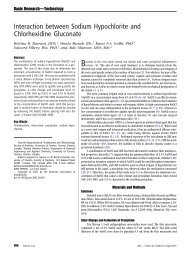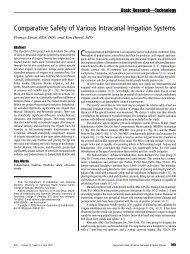Passive ultrasonic irrigation - The EndoExperience
Passive ultrasonic irrigation - The EndoExperience
Passive ultrasonic irrigation - The EndoExperience
Create successful ePaper yourself
Turn your PDF publications into a flip-book with our unique Google optimized e-Paper software.
<strong>Passive</strong> <strong>ultrasonic</strong> <strong>irrigation</strong>
Satelec introduces<br />
a revolutionary <strong>ultrasonic</strong> instrument<br />
IrriSafe is designed for the safe removal of the smear layer, dentine debris<br />
and bacteria from the root canal.<br />
IrriSafe instruments are used during <strong>Passive</strong> Ultrasonic Irrigation (PUI)<br />
with Sodium Hypochlorite (NaOCl).<br />
IrriSafe is small, parallel-shaped and non cutting (blunt-ended)<br />
and can therefore be used in the complete root canal.<br />
<strong>The</strong> revolution in eight points:<br />
• Very efficient removal of dentine debris,<br />
pulp tissue and bacteria.<br />
• Irrigation of the entire root canal,<br />
especially in the apical area.<br />
• Micro-cavitation and micro-streaming increase<br />
the efficiency of the irrigant (eg. thermal effect).<br />
• Manufactured in a special stainless steel,<br />
for efficient transmission of the <strong>ultrasonic</strong>s.<br />
• Can be pre-shaped for the treatment of curved roots.<br />
• Non cutting instrument, with parallel flutes,<br />
respects the root canal anatomy.<br />
• Minimally invasive protocol.<br />
• PUI improves the sealing of a root canal filling.<br />
non cutting rounded end prevents<br />
damaging the apical constriction.<br />
<strong>The</strong> <strong>ultrasonic</strong> revo<br />
Cleaning of the root canal is a ma<br />
Manual <strong>irrigation</strong> is not very efficient due<br />
Ultrasonic <strong>irrigation</strong> is essential for an efficia<br />
<strong>The</strong> shape of the new instrument<br />
improves micro-streaming and<br />
micro-cavitation in the fluids.
olution by Satelec ®<br />
ajor step in endodontic treatment.<br />
e to the complexity of the root anatomy.<br />
ant cleaning and disinfection of the root canal.<br />
IrriSafe should be used<br />
with a medium<br />
power setting<br />
<strong>Passive</strong> <strong>ultrasonic</strong> <strong>irrigation</strong><br />
with<br />
<strong>The</strong> protocol of the <strong>Passive</strong> Ultrasonic Irrigation (PUI)<br />
can be performed with any SATELEC piezo <strong>ultrasonic</strong> generator<br />
equipped with the “endo” mode, although the SP NEWTRON<br />
driven units will provide the greatest efficiency<br />
(ie. P5 and P-Max Newtron).<br />
Color Coding System<br />
by SATELEC:<br />
= yellow/endo mode<br />
• 1-3 minutes' <strong>irrigation</strong> at the end of the root canal preparation.<br />
• Continuous (3 minutes) or intermittent flushing (1 minute)<br />
with the irrigant, provides with PUI efficiency.<br />
• NaOCl is the recommended irrigant.<br />
• IrriSafe is inserted 1mm short of the working length.<br />
• IrriSafe must vibrate freely in the apical area.
Power settings<br />
Irri-Safe<br />
Bibliography<br />
P-Max XS<br />
P5 Newtron XS<br />
1. Ahmad M, Pitt Ford TR, Crum LA (1987a).<br />
Ultrasonic debridement of root canals: acoustic streaming and its possible<br />
role. Journal of Endodontics 14, 490-9.<br />
2. Lumley PJ, Walmsey AD, Walton RE, Rippin JW (1992).<br />
Effect of precurving endosonic files on the amount of debris and smear layer<br />
remaining in curved root canals. Journal of Endodontics 18, 616-9.<br />
3. Roy RA, Ahmad M, Crum LA (1994).<br />
Physical mechanisms governing the hydrodynamic response of an oscillating<br />
<strong>ultrasonic</strong> file. International Endodontic Journal 27, 197-207.<br />
4. van der Sluis LWM, Gambarini G, Wu MK, Wesselink PR (2006a).<br />
<strong>The</strong> influence of volume, type of irrigant and flushing method on removing<br />
artificially placed dentine debris from the apical root canal during passive<br />
<strong>ultrasonic</strong> <strong>irrigation</strong>. International Endodontic Journal 39, 472-7.<br />
5. van der Sluis LWM, Versluis M, Wu MK, Wesselink PR.<br />
<strong>Passive</strong> <strong>ultrasonic</strong> <strong>irrigation</strong> of the root canal: a review of the literature.<br />
International Endodontic Journal under press.<br />
6. van der Sluis LWM, Wu MK, Wesselink PR (2007).<br />
<strong>The</strong> evaluation of removal of calcium hydroxide paste from an artificial<br />
standardized groove in the apical root canal using different <strong>irrigation</strong><br />
methodologies. International Endodontic Journal Jan 40, 52-7<br />
7. van der Sluis LWM, Shemesh H, Wu MK and Wesselink PR (2007).<br />
An evaluation of the influence of passive <strong>ultrasonic</strong> <strong>irrigation</strong> on the leakage<br />
of root canal fillings. International Endodontic Journal under press.<br />
P5 Newtron P5 Booster<br />
P-Max Newtron<br />
ProphyMax Newtron<br />
Mini Maxi Mini Maxi Mini Maxi Mini Maxi<br />
6 7 6 7 4 7 4 7<br />
Photo, high speed camera Dr Fridus van der Weijden (ACTA, <strong>The</strong> Netherlands),<br />
in <strong>The</strong> Power of Ultrasonics. © Quintessence France-2007.<br />
<strong>Passive</strong> <strong>ultrasonic</strong> <strong>irrigation</strong><br />
17 av. Gustave Eiffel • BP 30216 • 33708 MERIGNAC cedex • FRANCE • Tel +33 (0) 556 34 06 07 • Fax +33 (0) 556 34 92 92 • E-mail: satelec@acteongroup.com • www.acteongroup.com<br />
Non contractual document - Réf. D43801-R2 - Copyright © 2007 Satelec. All rights reserved. No information or part of this document may be reproduced or transmitted in any form without the prior permission of Satelec.


